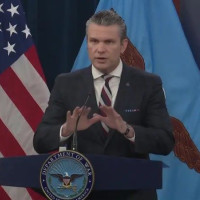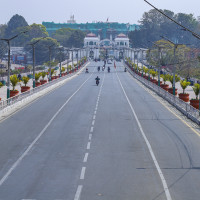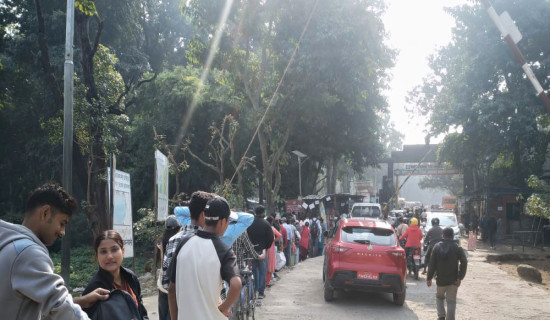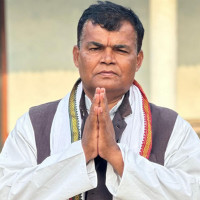- Thursday, 5 March 2026
Exploring Through The Madhes Capital
Looking out the window of a vehicle as we drive down the East-West Highway does not help us understand the better picture of the Madhes Province. To put it another way, Madhes Province, which is made up of eight Terai districts, is distinct from other provinces of Nepal. They have different objectives and have different cultures and traditions. And only when someone exits along the East-West Highway and travels south to the province's interior do all these variances become apparent. I came to this conclusion after visiting two of the province's biggest cities, Janakpur and Birgunj, about a fortnight ago. I can't recall how many times I've driven on the East-West Highway, but I do recall looking south from Dhalkebar and Pathlaiya, which, according to my parents, are the intersections that split the roads to Janakpur and Birgunj, respectively.
Years passed as I kept telling myself that I would soon visit these two locations as I drove along the highway. And in the final week of May, some work was done to improve access to these two major cities. I went to Janakpur to learn more about the current problems with loansharking (metre byaj). In a similar vein, the visit to Birgunj was made in order to learn more about the state of the Krishi Aujar Karkhana, a state-owned factory that manufactures agricultural tools that is currently being renovated by the National Innovation Centre under the direction of Mahabir Pun.
Beautiful Madhes
Even in words, viewing the Himalayas or the seas would seem more spectacular than simply seeing plain landscapes, green trees, clear skies, and ponds. Or it might, especially for a young person who grew up in the greenery of the Terai but subsequently resided in Kathmandu's concrete metropolis (one needs a tolerance for heat to enjoy the Terai). After travelling around 44 kilometres from Dhalkebar, a high-quality, six-lane highway enters Janakpur, the capital of the Madhes Province. Janakpur has the potential to be distinguished as a distinctive city while having the characteristics of a typical Nepali urban centre in the centre and a dense population outside of a few kilometres. There was a pond surrounded by buildings. There was another a little farther away. While travelling further, a third one might come to your view. There were simply too many to count. Nearly everywhere in Janakpurdham and the other local levels, including Dhanushadham, one might see a little square or a rectangular pond. According to the Nepal Tourism Board (NTB), Janakpur, which was the capital city of Mithila centuries ago, has as many as 72 ancient ponds of historical and mythological importance.
Coralynn V. Davis, a writer, after visiting Janakpur in October 2003, glorified the ponds as they worked as a bridge to connect the new generations with the old. "The Mithila region is characterised by village clusters surrounded by irrigated rice fields and dotted with ponds. Ponds are arguably the ‘single most prominent geological feature’ of the Mithila region," Davis writes in a journal titled "Pond-Women Revelations: The Subaltern Registers in Maithil Women’s Expressive Forms," published in the Journal of American Folklore. Ponds are used by the residents as a gathering spot as well as a place to wash dishes, clothes, and take baths. Ponds are the centre of a lot of Maithili folklore that has been created and is currently being passed down through the generations as a part of their history.
The Janaki Temple, a representation of Mithila culture, is one of the unique temples in Janakpur. Janakpur's cuisine and sweets both have a distinctive flavour of their own. Furthermore, despite its architectural progress, Janakpur continued to have the appearance of an ancient city that adhered rigidly to traditional and cultural norms and was reticent to embrace modernity as readily as other cities. The Madhesi people are viewed as "others" in Nepal, which is a painful reality. The inhabitants of Janakpur and other Madhesi locations, however, are nicer, more helpful, and more supportive, so it is clear that any prejudice will vanish when visiting this place.
Missing Expectations
Locals might be observed congregating and talking about current events in several locations. The fact that only men attended the events, however, demonstrated the persistence of patriarchal values in Madhes. While the males talked, women could be observed doing their household chores all day. Similar to this, the city was painted entirely red in a few locations, including religious buildings, as a result of spitting after chewing tobacco. Even though people were fully aware of the city's importance for religion, history, and tourism, garbage was pervasive.
Both in the ponds and along the roadways, garbage could be seen. People drove their cars over the highway barrier, crossed the street at any point they pleased, and three people on a motorbike were frequent sight. Traffic police maintained their composure and diligence even though the city was sub-metropolitan and also served as the Madhes region's capital. Traffic laws were routinely broken because of poor enforcement on the part of local, district, and provincial officials.
"I have Nepali citizenship by descent. For my son's citizenship certificate, I must pay Rs. 5,000. Although it is against the law, it is required in the Madhes, according to a man selling fast food by Ganga Sagar, a significant reservoir in Janakpur.
The Madhesi people are aware of how the wealthy exploit them. The system that exists is far from fair. It is necessary to completely restructure, yet it looks quite challenging. For the impoverished lot, the reality can be full of agony, he added. But even intelligent people from middle-class households had to fight for justice in the province.
On May 21, Janak Kumari, 52, a resident of Bateshwor in Dhanusha district, arrived at the DAO with her daughter, holding her granddaughter in her arms. She then asked the Chief District Officer of Dhanusha to oppose the loan sharks who were terrorising them. Even though he paid more than the agreed upon sum, the loan shark has not returned our collateral. We even made it to the court. But money lender continues to threaten us, declaring that he could easily purchase the CDO and the court.
I came here to implore the CDO to continue upholding justice for this reason, said Kumari. The daughter of Kumari, who had travelled from Kathmandu to assist her mother, asserted that she preferred the busy city of Kathmandu to the liberated, unrestricted, and stunning city of Janakpur.
(Paudel is a journalist at The Rising Nepal.)











-original-thumb.jpg)




